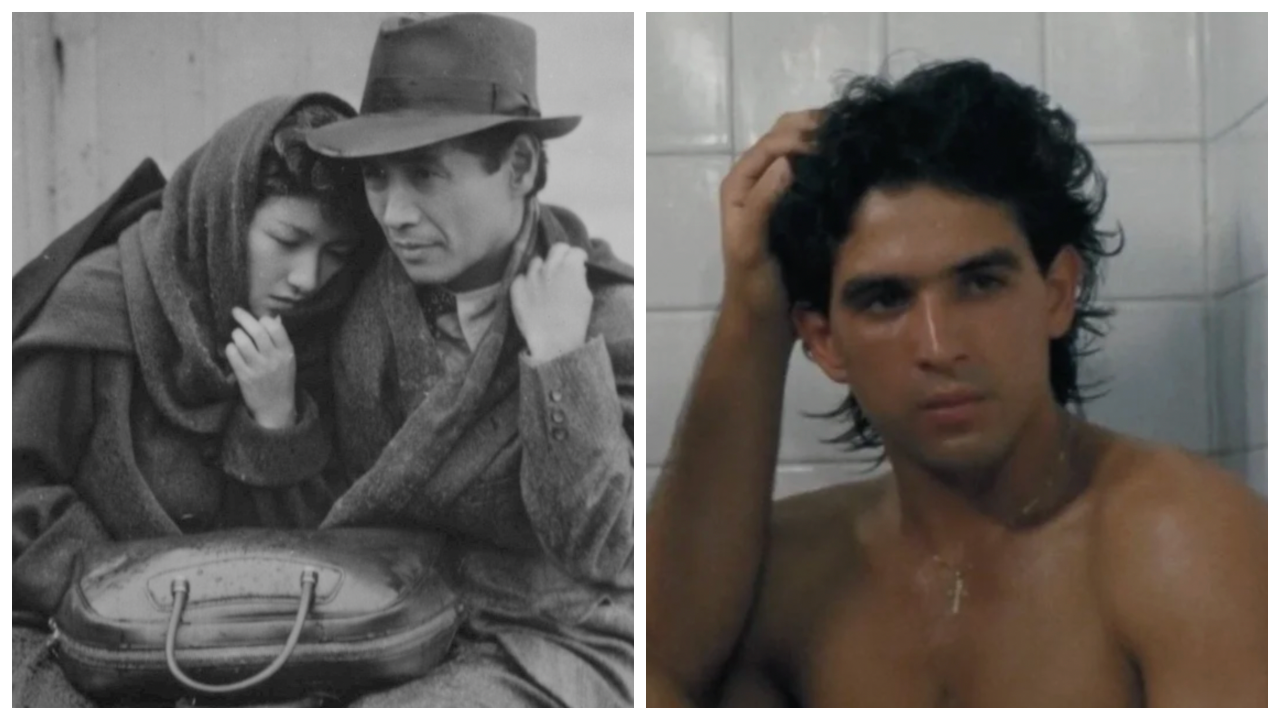As the nice weather we’ve waited for all winter long finally arrives, plenty of us are preparing to descend into the darkness for most of the next two weeks.
Yes, it’s time once again for the Minneapolis-St. Paul International Film Festival, which arrives every mid-April. (That’s how I remember that my taxes are due.) For this year’s MSPIFF, which runs from April 13-27, screenings are once again clustered in The Main Cinema (sorry John Wick, you gotta go) with a few showings at The Capri and the Landmark Center (and even some in Rochester).
As always, the organizers have divided the films into a series of programs, from “Nextwave Family Features” (kid stuff) to “Dark Out” (spooky stuff). The whole shebang is bookended with some musical movies—the opening night film is Bill Pohlad’s Dreamin’ Big, the closing film is the Indigo Girls doc It’s Only Life After All.
“But Keith,” I hear you say, “that’s all basic info I can find on the festival’s dang website. What value are you adding to this conversation, besides letting us know you haven’t finished your taxes?” A fair question, my imagined interlocutor. So, you go over and look at that website now for a couple minutes. You back? Good. That’s a lotta goddamn movies, isn’t it? Something like 130 or so. Now can you honestly tell me that you’re not overwhelmed by the options? Do you have any idea where to start?
Two weeks ago, I was where you were—frightened, desperate, alone, scanning the schedule and wondering where to start. But then I got down to work, and I whipped up the Educated Guesser’s Mini-Guide to MSPIFF you’ll find below.
How’d I do it? I watched the handful of screeners that were available and plucked out my faves. I weeded through the calendar, did some research, and predicted the best of the rest. And I had to mention a few of the more notable Minnesota-centric movies, didn’t I?
Anyway, I hope it offers you a little bit of a roadmap for the weeks ahead, or helps you figure out your own path through the MSPIFF thickets.
Come back next week for my mid-fest report on what I loved, what I liked, and what I loathed.
Faves So Far
I’ve seen only a small percentage of the films screening at the festival this year, but out of that tiny fraction, here are my favorites.
Joyland
Haider (Ali Junejo) is a meek, unemployable Pakistani man who lands an unlikely job as a backup dancer at a disreputable theater, where he falls for Biba (Alina Khan) the stately trans star of the show. He hides the true nature of his job from his father, a cranky patriarch who’s tired of granddaughters and demands a son from Haider. He hides his infidelity from his wife Mumtaz (Rasti Farooq), who has been forbidden to work by Haider’s tyrannical dad. For his directorial debut, Saim Sadiq has plenty of balls to juggle with this family drama, and he mostly keeps them in the air as he explores the way gender traditionalism breeds dishonesty and distorts relationships. More info here.
King Coal
Elaine McMillion Sheldon has composed a striking visual essay about how coal has tightened its cultural hold on the director’s native West Virginia and the surrounding states even as its economic importance has declined. She gathers some almost unbelievable examples of how ideologically intertwined with the region’s customs and traditions coal remains—a hunk of coal being lowered on New Year’s Eve countdown, a “Miss Coal” beauty pageant, a footrace where bystanders traditionally toss coal dust at the runners. Much of this is witnessed through the tween eyes of a girl named Lanie Marsh, which adds to the dreamlike aura of the film. More info here.
Medusa Deluxe
An entrant in a regional hairdressing competition is murdered, and everyone at the event has a different suspect in mind. If you’re expecting a taut whodunnit, the conclusion might disappoint you. But along the way to that flawed wrap up, writer/director Thomas Hardiman gifts his characters with some sharp dialogue and gives many of them a chance to hold court and present his or her views in a setting that’s claustrophobic but never static. Oh, and also, you get to see some truly fantastic examples of hairdressing. More info here.
Sam Now
“My ordinary American family has a troubling secret!” is a genre of documentary film that we have more than enough of these days, but Reed Harkness really peers under the dysfunctional hood here. At the center of the film are the efforts of Reed and his half-brother Sam to track down Sam’s mother, who abandoned her children when he was in elementary school, but that’s just the tip of the trauma iceberg. What makes Sam Now work visually are Sam’s zany childhood performances in Reed’s homemade Super 8 films, but what makes it work emotionally is its refusal to look away. The result is like a harrowing, extended family therapy session, but we’re given some hope the younger Harknesses may actually break the patterns their elders could not. More info here.
Showing Up
With its collection of eccentrics and mood of comic melancholy, Kelly Reichardt’s followup to First Cow is the most conventionally “arthouse” film of her career, but it’s still something special. She’s again teamed (for the fourth time) with Michelle Williams (acting much less rampantly than in The Fabelmans), who plays a sculptor preparing for a show while dodging multiple distractions: a wounded bird that needs caring for, her brother’s bout with mania, and the fact that her flighty friend/landlord (the ever-terrific Hong Chau, who’s certainly having a moment) refuses to buy a new hot water heater. Reichert is lovingly satirical of her characters’ foibles (though Showing Up sure captures everything that drove me crazy about living in the PNW for two years, from unapologetic spaciness to oblivious couch surfers) in a film that insists that art, like any other task in life, takes (and deserves) time. More info here.
Stonewalling
From directors Ji Huang and Ryûji Otsuka comes a slow-burning tragedy about a directionless young woman buffeted about by contemporary China’s hustle culture. (The insanity of the grindset worldview isn’t just a U.S. affliction.) As everyone around her seems to be hawking some dubious scheme or another, Lynn (Honggui Yao) half-heartedly studies English at her go-getter boyfriend’s urging and trains to be a flight attendant. When she learns she’s pregnant, her plans to sell her eggs to wealthy buyers is quashed, but her mom sees another business opportunity. Shot from a distance, in long takes, Stonewalling has a hands-off quality to it that coolly studies Lynn rather than empathizing, and that makes her fate seem that much more cruel. More info here.
Locally Angled
You can find MSPIFF’s full “Minnesota Made” program here, and there’s plenty worth exploring. But here are the Minnesota-affiliated flicks I’m most curious about.
Brutal Utopias
As we’ve made known before, Racket is a staunchly pro-brutalism shop. Will filmmaker Morgan Adamson’s look at the history of urban design in Cedar-Riverside make us feel like jerks about that? We’ll just have to wait and see! This film begins in 1968, when architect Ralph Rapson’s plan to flatten the neighborhood and rebuild it with concrete clashed with the hippies and anarchists who lived there, and carries forward to talk to the East African refugees who live in the neighborhood today. More info here.
Cue the Strings—A Film About Low
Director Phillip Harder filmed Low throughout its nearly 30-year career, right up to the Duluth band’s final 2022 hometown performance. Much of that footage found its way into music videos and short films, but some of it went into the filmmakers archives. For this feature, Harder reassembled his original 16mm negatives, including outtakes and other unreleased footage, mixing new material with old to create a monument to the visual legacy for a great Minnesota band. And, of course, it can’t help but be a tribute to the late Mimi Parker, whose death last year brought Low’s arc to its end. More info here.
Pay or Die
You’ve gotta admire the blunt title that directors Scott Ruderman and Rachael Dyer picked for their look at the insulin crisis, because really, that’s what it comes down to. The directors talked to families (including Minnesotans) about the struggle of diabetics to get the medicine they need to live. It’s a timely film, as a federal appeals court just gave the go ahead to a lawsuit that the Pharmaceutical Research and Manufacturers of America filed against Minnesota, claiming that a new law requiring them to provide free insulin to diabetics in certain circumstances is unconstitutional. More info here.
Minnesota Mean
Minnesota director Dawn Mikkelson is a MSPIFF mainstay. Where her last film was the bracing Risking Light, which spoke to survivors of great emotional loss, her latest documentary tackles a much lighter topic. Mikkelson hunkered down with the Minnesota Roller Derby, capturing the thoughts and moods of its team members as they worked their way to the 2017 championship. Some of those roller derby members will be at the screening with Mikkelson. And there’s music from Dessa. More info here.
Dreamin’ Wild
Local rich-guy-made-good Bill Pohlad made his name as a director with Love & Mercy, a smartly devised Brian Wilson biopic. Pohlad’s new directorial feature, another musical biography, focuses on an act far more obscure than the Beach Boys. Casey Affleck and Walton Goggins are Donnie and Joe Emerson, a pair of brothers who made a very strange pop-soul record at the end of the ’70s called Dreamin’ Wild (you saw that coming, right?) and then vanished. There’s a lot more to the story than that, and from the little bit I know of it, it should be a hell of a subject for a movie. More info here.
Most Anticipated
Here’s where the guesswork comes in. After studying critics’ reviews, considering recommendations from friends, and just plain going with my gut, I narrowed the MSPIFF schedule down to the nine movies I most want to see. But then, because I felt bad about what I left off, I tacked on a dozen honorable mentions, without commentary.
One note: On the theory that the best way to do MSPIFF is to watch the movies you can’t see otherwise, I’ve omitted films slated for a broader release in the next month or so, including Polite Society, Judy Blume Forever, and Chevalier.
The Angry Black GIrl and Her Monster
MSPIFF’s “Dark Out” program always collects a few thoughtfully creepy films worth your time, including some of my favorites from last year’s festival. This year it includes Medusa Deluxe (mentioned above) and Birth/Rebirth, which seems to riff off Frankenstein in a novel way. But I’m more curious about this revamp of Frankenstein. (One more and it’s a trend, right?) In Bromani J. Story’s film, a girl loses her brother to gang violence and decides to reanimate him. I’m guessing all does not go as planned (does it ever?) and I suspect that Story handles the questions of otherness, race, and monstrosity that arise in interesting ways. More info here.
Blackberry
I’m not a gadget guy, but I do appreciate the intersection of geekery and business shenanigans when they’re presented right. And this rise-and-fall story of the once market-dominant phone, now essentially a footnote in tech history, sounds like a helluva yarn, with a silver-haired Jay Baruchel leading up a promising cast that includes Cary Elwes and Michael Ironside in smaller character roles. Critics keep using the word “entertaining” to describe it, as they often do when they didn’t expect to be entertained, or when they’re worried you’ll think it’s a drag. Blackberry seems to be a cautionary tale about how the pace of the industry dooms creative upstarts—not that many who followed in Blackberry’s wake have been more cautious. More info here.
The Blue Caftan
Mina (Lubna Azabal) is the wife of a Moroccan tailor, Halim (Saleh Bakri), and with business booming, she insists that he hire an apprentice, Youssef (Ayoun Missioui). At first Halim and his new helper don’t seem to get along. But then they start to get along, um, very well. Maryam Touzani’s film not only looks at the way closeted same-sex love expresses itself in Morocco, where it is criminalized, but at the traditional tailor’s craft that Halim practices. The reviews make it sound so lovely and swoony that I’ll forgive the critic who called it “as precise and vivid as its titular garment.” More info here.
Our Father the Devil
I wasn’t able to catch Cameroonian-born director Ellie Foumbi’s debut feature when it screened as a Spirit Award nominee at the Walker earlier this year, so I’m glad to get a second chance. Babetida Sadjo is reportedly spectacular as Marie Cissé, an African refugee whose peaceful life in a small French village is upended when a new Catholic priest arrives in town. She recognizes him as the warlord who murdered her family, and is torn between a desire for revenge and the need to forgive. More info here.
R.M.N.
The latest from Romanian director Cristian Mungiu (still best known for his movingly bleak 2007 abortion picture 4 Months, 3 Weeks and 2 Days) knocked ‘em dead at Cannes last year. The plot is simple: When a local bakery decides to employ immigrants, a small town’s xenophobia explodes. The xenophobia, though… the xenophobia is very complex. The film’s much-lauded centerpiece is a 17-minute single take of a particularly nasty town meeting, and critics have also hailed Marin Grigore’s performance as Matthias, a German slaughterhouse worker seeking a new life in Transylvania. I guess the title is what Romanians call MRIs, but don’t ask me why. We’ll have to find that out together. More info here.
Tori and Lokita
A Dardennes brothers film is no longer the sure bet it was 10, 15 years ago—the past two movies from the Belgian sibs (The Unknown Girl, Young Ahmed) have been wobbly outings. But at their best, no writer/director team captures just how much work it is to be poor, showing the difficulties and indignities of life on the economic margins without succumbing to special pleading. In their latest, two African immigrants, an 11-year-old boy and a 15-year-old girl, pose as brother and sister as they try to navigate Belgium’s official bureaucracy and its underground drug world. Fingers crossed, because the Toris and Lokitas of the world deserve the Dardennes working at their peak. More info here.
Trenque Lauquen
For some of us, it’s just not a film festival without settling in for a day-busting multi-hour epic. This year, with apologies to Lav Diaz and his merely three-hour revenge drama When the Waves Are Gone (which, don’t get me wrong, I also hope to check out) Laura Citarella’s two-part, 12-chapter, 250-minute Trenque Lauquen is that epic. The basic story is that a biologist disappears and two men travel to the titular Argentine city to begin their search for her, but we’re promised stories within stories, a little of the old supernatural, and maybe even some dirty parts. (Don’t quote me on that last bit—I just saw “erotic” used in a couple reviews.) Anyway, let’s face it, it’s now or never: Even if Trenque Lauquen does stream, do you think you’re ever gonna watch six hours of South American cinematic metafiction at home? More info here.
The Tuba Thieves
One reason I’m so excited for director Alison O’Daniel’s documentary is that I barely have a clue what it’s about—every review I’ve scanned seems to be trying to describe the indescribable. The film riffs off a mysterious series of tuba thefts from Los Angeles schools between 2011-2013, but that’s not really the subject. The Tuba Thieves, I gather, is more concerned with sound, and its absence, the experience of deafness and the experience of silence, and O’Daniel apparently makes daring sonic and visual choices to capture those experiences. Fans of just-the-facts docs will want to pass (they have plenty—if not too many—alternate options). The rest of us may be in for something special. More info here.
Walk Up
Between the time I finish this blurb and the day this movie screens, Korean director Hong Sang-Soo may well have finished another film. (He already just premiered a newer movie at Berlin in February.) His partisans swear by every one, but since we don’t get many of them out this way (and they don’t always stream) I’ve fallen way behind. This one, in black and white, is touted as a dreamlike puzzle of a movie. In it, a filmmaker and his estranged daughter are guided, floor by floor, top to bottom, through a four-story building by the woman who redesigned its interior. Pretty straightforward, right? But check out this twist: Then they go up through the building, floor by floor. Wait, is that a spoiler? More info here.
Runners Up: The Beasts, Being Mary Tyler Moore, Black Art in the Absence of Light, Bobi Wine: The People’s President, Falcon Lake, I Like Movies, Kokomo City, Love According to Dalva, A Still Small Voice, Totem. Two Trains Runnin’, World War III






